Editor’s note: This post is the latest installment in the Law and Linguistics Interdisciplinary Researchers’ Network (LLIRN) “About Us” blog series. The aim of the “About Us” blog series is to help a wide readership learn about the research, expertise and goals of the network’s members. In this third post in the series, you can learn (or “LLIRN”) more about six network’s members’ work on language and inclusion in the law.
This post is one of the outcomes of a themed session on law and linguistics research held at the ALS Conference on 27 November.
***
Dr Joseph van Buuren
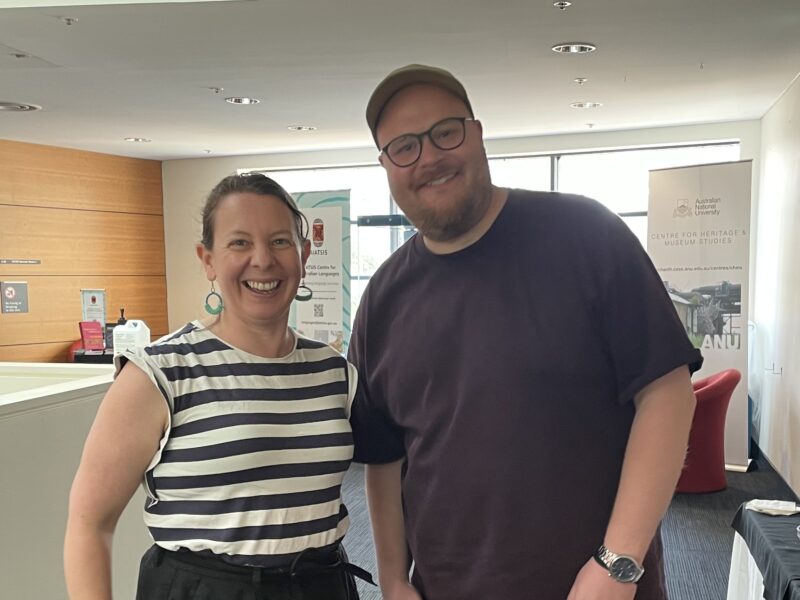
ALS Conference (L-R): Dr Alexandra Grey and Dr Joseph van Buuren, November 2024
Joe van Buuren is currently working as a lecturer in Criminology and Justice studies at RMIT University in Narrm (Melbourne). His work has focused broadly on the ways that discretionary power is exercised by police and courts in the provision, and denial, of interpreter access of language minoritised witnesses and accused people. He is particularly interested in examining how this power can reflect an ideological adherence to ‘English-only’ communication.
More recently, his research has examined the ways that legal judicial discourses operate to deny the racialised dimensions of linguistic discrimination and marginalisation. This denial extends to the law itself, which courts can frame as operating ‘neutrally’ to race, while doing anything but in relation to language. This denialism, sustained judicial narratives of formal equality, contributes to the criminalisation of language minoritised people within the criminal punishment system.
Recent Publication
van Buuren, J. (2024). Justice in English-only. Social and Legal Studies, 33(2), 191–212. https://www.rmit.edu.au/contact/staff-contacts/academic-staff/v/van-buuren-dr-joseph
Dr Dissake Koumassol Midinette Endurence
Dr Dissake Koumassol Midinette Endurence’s research examines language-related challenges in courtroom discourse in the Republic of Cameroon. She utilises Speech Act Theory and Interactional Sociolinguistics to analyse the speech acts of both legal professionals and lay litigants. She demonstrates that the use of exoglossic languages in such a multilingual nation poses serious issues for effective communication in the legal context.

Dr Dissake Koumassol Midinette Endurence
Her current research project, sponsored by the Alexander von Humboldt Foundation, aims to demonstrate that the implementation of statutory laws from legal systems such as Civil and Common Law does not adequately address the legal needs of African Indigenous communities.
To establish the effectiveness of oral legal traditions in African rural communities, she has also documented, transcribed, translated, and analysed the Tunen language and the legal traditions of the Banen community in Cameroon.
More broadly, her research intends to explain the field of Forensic Linguistics by exploring African oral traditions. She introduces a novel approach to legal linguistic by examining traditional courtroom discourse in native and foreign languages.
Recent Publications
Dissake, K. M. Endurence. (2021). Language and legal proceedings: Analysing courtroom discourse in Cameroon. New York: Palgrave Macmillan.
Dissake, K. M. Endurence. (2021). Assessing litigant’s language proficiency: The case of the Bafoussam Court of First Instance. Language policy 21. 217-234.
Emma Genovese
Emma Genovese is a PhD Candidate and Quentin Bryce Law Doctoral Scholar at the University of Technology Sydney, Australia. Her PhD research draws from queer and corpus linguistic method to explore the construction of sex, gender, and sexuality in Australian law. Her work is focused upon uncovering the normative and historical underpinnings of legislation, along with emphasising how these constructs negatively impact queer identities.
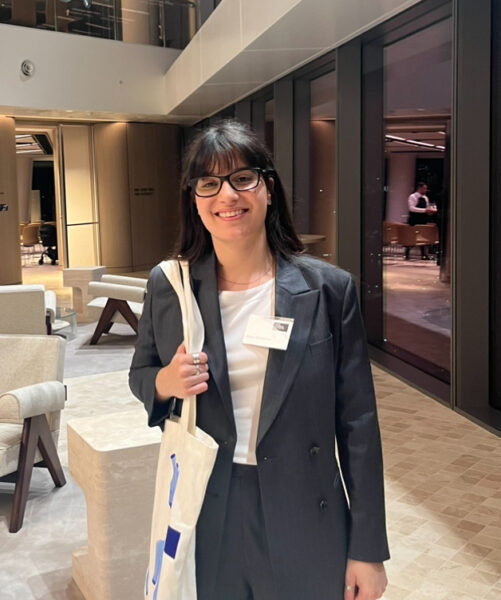
UNSW Law Journal Launch, Emma Genovese, July 2023
As part of her research, Emma built the Australian Legislative Corpus 2023 (‘ALC23’). The ALC23 includes all available and machine-readable acts, regulations, and rules across the nine major jurisdictions in Australia. It includes in force legislation as at 30 June 2023, and is able to be searched according to a variety of different sub-corpora.
More recently, her research examined cases in Australian criminal courts that referenced, or involved, trans people, in order to critique the language used by judicial officers. She argued that judicial judgments often disregard, dismiss, or deny the experiences of trans people. Her article also demonstrated that the lack of knowledge surrounding trans issues also had implications on the outcome of cases.
Recent publications
Genovese, E. (Forthcoming). Building the Australian Legislative Corpus 2023 – Combatting Issues and Highlighting Applications of General Legislative Corpora. International Journal of Law and Language.
Genovese, E. (2023). The Spectacle of Respectable Equality: Queer Discrimination in Australian Law Post Marriage Equality. UNSW Law Journal 46(2). 650-727.
Genovese, E. (2023). Administering harm: the treatment of trans people in Australian criminal courts. Current Issues in Criminal Justice 36(2). 177-196.
Dr Alexandra Grey
Dr Alexandra Grey combines legal and linguistic research approaches to study how governments respond to linguistic diversity, and how those responses redistribute or entrench hierarchies of power, access to resources and social grouping.
Her early work focused on laws supporting the inclusion of the Zhuang minority language in the ‘linguistic landscapes’ of China, and she has recently updated this work with an analysis of a decision in China that deemed certain regulations about bilingual schooling unconstitutional.
She has also focused on the application of international human rights law about linguistic discrimination. This includes in relation to the need of to engage with linguistic inclusion to fulfill their right to health obligations when communicating about Covid, along with whether a ban on prisoners in Australia communicating in languages other than English was a form of racial discrimination of impinged upon their freedom of expression.
Alexandra is currently working with First Nations colleagues on research about self-determination and the role of governments in Aboriginal language renewal in NSW, Australia, and a related study of the increased use of Aboriginal and Torres Strait Islander languages in parliaments across Australia and certain parliamentary rules which restrict this inclusion. She’s especially interested in collaborations on related themes with First Nations scholars in Taiwan, NZ and Canada, and in collaborations about interdisciplinary methods.
Recent publications
Grey, A. (2021). Language Rights in a Changing China: A National Overview and Zhuang Case Study, (Contributions to the Sociology of Language #113) De Gruyter: Boston.
Grey, A. (2021). Language Rights in a Changing China: A National Overview and Zhuang Case Study, Abridged Mandarin Version (translated by Gegentuul Baioud), 1-22. Language on the Move: Sydney.
K Thorpe, L Booker, A Grey, D Rigney, and M Galassi. (2021). The Benefits of Aboriginal Language Use and Revival – Literature Review. UTS Jumbunna Institute of Indigenous Education and Research.
Grey, A. and Smith-Khan, L. (2021). ‘Linguistic diversity as a challenge and an opportunity for improved legal policy’. Griffith Law Review 30(1). 1-17.
Grey, A. (2021). ‘Perceptions of invisible Zhuang minority language in Linguistic Landscapes of the People’s Republic of China and implications for language policy’. Linguistic Landscape 7(3). 259-284
Grey, A. (2022). ‘How Standard Zhuang has Met with Market Forces’, in Nicola McLelland and Hui Zhao (eds) Language Standardization and Language Variation in Multilingual Contexts: Asian Perspectives (#171, Multilingual Matters series). De Gruyter, 163-182.
Grey, A. (2023). Lawful limits on freedom of expression for private communications ‘in public life’. Cambridge International Law Journal 12(2). 328–336.
Grey, A. (2023). Communicative Justice and Covid-19: Australia‘s pandemic response and international guidance. Sydney Law Review 45(1). 1-43
Grey, A. (in print for 2025). ‘The Handbook of Linguistic Human Rights’, Tove Skutnabb-Kangas and Robert Phillipson’ (Skutnabb-Kangas, Tove and Phillipson, Robert (eds). 2023. The Handbook of Linguistic Human Rights. Wiley Blackwell. 712 + viii. Sociolinguistic Studies, issue 19.1.
Dr Stafford Lumsden
Dr Stafford Lumsden is the in-house educational designer at the University of Sydney Law School. He applies his interest in multimodality and social semiotics to the design and development of online learning environments for units in the LLB, JD, and masters programs. Currently, he is part of a team investigating the use of inclusive Socrative approaches in undergraduate law units to increase student engagement and inclusivity among diverse student cohorts. His recent work has focused on the use of semiotic resources other than language in online teacher training, and in September 2024 he presented on the topic at the 22nd International CALL Research Conference hosted by the Waseda University Law School.
Stafford is keen to collaborate with legal education researchers interested in the use of text, video, audio, and non-language semiotic resources in online teaching and learning in law.
Recent Publications
Lumsden, S. (In Press). A multimodal social semiotic approach to TESOL educator professional development. In A. Alm, C. Lai, & Q. Ma (Eds.), Transitions in CALL. Castledown.
Lumsden, S. (2024, September). A multimodal social semiotic approach to TESOL educator professional development. In Proceedings of the International CALL Research Conference (Vol. 2024, pp. 163-168).
Lumsden, S., Djonov, E., and Slatyer, H. (2024). The multimodal community of inquiry: A framework for evaluating online learning environments in higher education in Lim, V.L. and Querol-Julián (Eds.) Designing Learning with Digital Technologies. Perspectives from Multimodality Education. Routledge.
Lumsden, S. (2023). Student Writing Support with Generative Artificial Intelligence. The English Connection 27(3). 7–12.
Dr Kashif Raza
Dr Kashif Raza is a SSHRC Postdoctoral Fellow at the Faculty of Education, University of British Columbia, Canada. His research focuses on language-in-immigration policies in Canada and their impact on the immigration, settlement, and integration experiences of multilingual skilled immigrants.
At the federal level, he examines how Canada’s points-based immigration system, which incorporates language testing, marginalizes linguistic diversity among the multilingual skilled workforce. Provincially, his work investigates the limited availability of translation and interpretation services in Alberta’s legal system, highlighting a reliance on co-ethnic legal counsel.
This provincial dimension is a key area of interest in his research and he is currently exploring the ways co-ethnic lawyers use their shared linguistic repertoire to support clients with lower English skills and how this mediates multilingual communication in legal procedures.
Recent Publications
Raza, K. (2022). Linguistic outcomes of language accountability and points-based system for multilingual skilled immigrants in Canada: A critical language-in-immigration policy analysis. Journal of Multilingual and Multicultural Development 45(7). 2605-2619
Dr Dima Rusho
Dr Dima Rusho’s research examines the language and communication barriers impacting access to the justice system for Indigenous Australians in remote communities. Dima is particularly interested in exploring inequalities of access as a critical social justice issue. Dima has recently completed a project about optimising interpreting and other forms of language support for Indigenous Kriol speakers in circuit courts in two remote communities: Ngukurr and Borroloola.
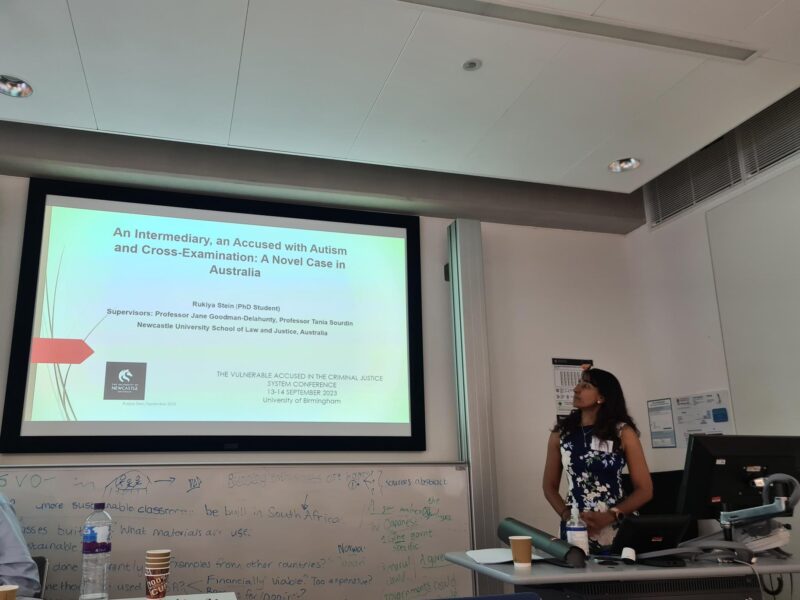
Rukiya Stein at the Vulnerable Accused in the Justice System Conference in Birmingham, 2023
Dima’s future research will continue to explore the provision of language support for Indigenous language speakers, with a focus on establishing language support models involving advocacy.
Recent Publications
Rusho, D., Bradley, J., and Dickson, G. (Forthcoming). Tailoring language support in legal contexts for Indigenous communities: Insights from Ngukurr and Borroloola. Trends and Issues in crime and criminal justice.
Rusho, D. (2024). Coloniality and Australian Indigenous language interpreting in legal settings. In Ndhlovu, F. & Ndlovu-Gatsheni, S. (Eds), Routledge Handbook of Language and Decolonisation. Routledge.
Rusho, D. (2023). First Nations interpreters cannot be neutral and should not be invisible. Translation and Interpreting, 15(1). 120-134.
Rusho, D. (2022). Cross-currents: Indigenous language interpreting in Australia’s justice system [PhD thesis].
Rukiya Stein
Rukiya Stein is an Accredited Witness Intermediary, an independent communication intermediary and a Certified Speech and Language Pathologist who facilitates communication for vulnerable children and adults when they give evidence in investigative interviews and at court. Her current thesis explores the role of the intermediary on lawyer questioning and the evidence provided by adults with disabilities in the Australian criminal justice process. She is specifically examining the linguistic complexity of cross-examination, intermediary recommendations on the structure and form of questioning and the clarity of evidence.
She is currently an intern at the Judicial Commission of New South Wales. She has provided a number of trainings and workshops to judges, magistrates and lawyers on effective communication in the courtroom, the intermediary role and effect of disability on participation in the justice process.
Recent Publications
Stein, R., and Goodman-Delahunty, J. (Forthcoming) Bridging the Justice Gap: Inequity in Provision of Intermediary Assistance for Adults with Disabilities, Alternative Law Journal.
What about you?
Do you work or research in an area related to multilingualism in courts and tribunals, or another area where language and law intersect? Join the LLIRN!
What other language and law topics would you like to learn about? Have your say on our next “LLIRN About Us” blog post. Let us know in the comments or join the network and send us an email!


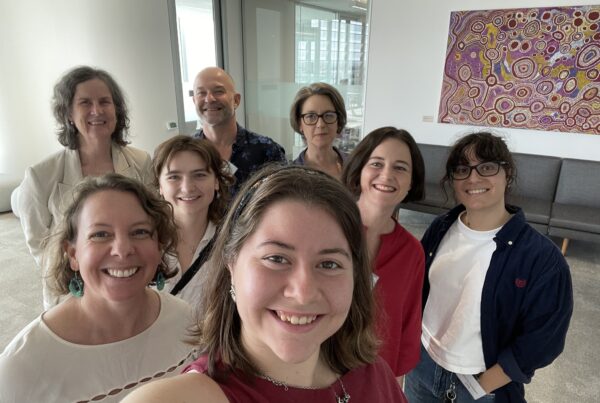
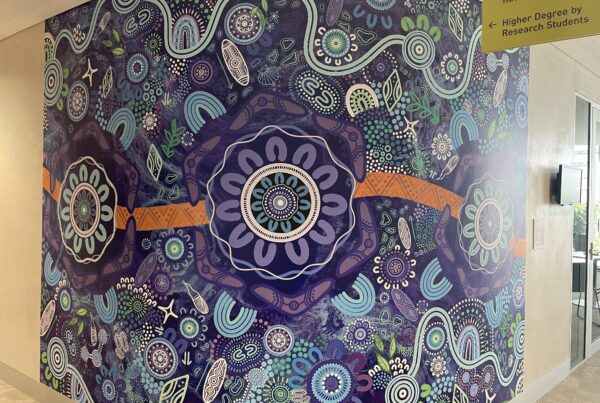


 This work is licensed under a
This work is licensed under a